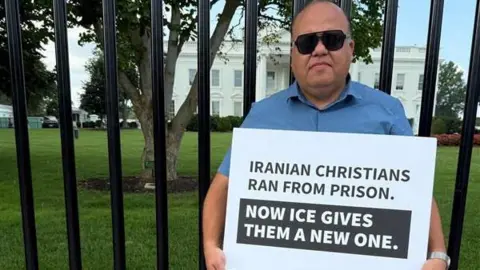 Environmental Protection Agency
Environmental Protection AgencyOne Monday in mid-October, after a year in U.S. immigration custody, officers arrived unannounced at Majid's cell in Texas.
They told him to just “pack up” – that he was being resettled – even though an immigration judge had already granted him protection from removal five months earlier. Shackled at the wrists, waist and ankles, he was driven all night to a military airfield in Louisiana.
Majid (not his real name) fled Iran for the United States in October 2024 after repeated detentions and alleged torture, first because of his participation in the Mahsa Amini protests and then because of his conversion to Christianity.
When U.S. officials forced him onto a plane carrying more than 150 deportees bound for Managua, Nicaragua, he recalls being the only non-Hispanic on the plane. Hours later, the plane landed and officials handcuffed him, rejected his request for asylum and sent him on a route through Venezuela and Turkey toward Iran – a journey he perceived as a forced return.
Later, Majid managed to hide in Istanbul, frightened by what awaited him in Iran. He is one of several Iranian Christian converts who spoke to the BBC – mostly anonymously out of fear for relatives back home – whose asylum claims were rejected last year. Their reports highlight inconsistencies in how U.S. authorities assess the risks Iranian returnees face and how sensitive religious information is handled in asylum files.
Their experiences also contrast with other elements of US foreign policy, as President Trump has publicly lamented the plight of Christian persecution abroad, threatening to send troops to Nigeria “guns blazing” if its government “continues to allow the killing of Christians.”
A White House spokesman told the BBC that the asylum claims of all deportees had been fully assessed before removal. The official said recent deportations to Iran involved people who had received a final deportation order or those who requested voluntary departure. They added that strict confidentiality rules prevent officials from disclosing whether someone has applied for asylum and been denied.
Rare deportation flight
Continuing the crackdown on illegal immigration that was a centerpiece of Trump's winning re-election campaign, the US has made unprecedented changes to its policy towards Iranian asylum seekers.
In late September, authorities arranged a charter flight to Iran via Qatar, the first in decades given Iran's lack of diplomatic ties and human rights record. The flight represented an unusual example of cooperation between Iran and the United States.
There were dozens of Iranians on board the plane, reportedly in shackles. One deportee, Sina, later described armed guards accompanying passengers on the Qatar-Tehran route. Upon arrival, they were questioned about their time in the US and their religious activities, but were not immediately arrested, he said in a video posted on a Farsi YouTube channel.
Among the passengers was the wife of Ali, an Iranian Christian now living in the United States. She has since been contacted and Iranian intelligence has been called in.
“They deported my wife back to Iran, even though she is a Christian,” Ali says. The BBC gave him a pseudonym to protect the identities of him and his wife. “Now Iranian intelligence is after us with her.”
For Ali's wife and others, the danger was compounded by what their lawyers called a critical mistake.
Lawyer Ali Herisky, who represents Ali, his wife and another deportee on the September flight, says several clients have reported that sensitive information, including statements about religious conversions, political activities and reasons why they sought asylum, was not removed before deportation.
 Getty Images
Getty ImagesWhy Return Is Dangerous for Christian Converts
Converts from Islam make up a significant proportion of Iran's Christian population, estimated at 800,000, says Steve Dew-Jones of Article 18, a British rights group that monitors abuses against Christians in the country.
Since officially recognized churches are severely limited, house churches began to appear all over the country. But practitioners continue to face persecution, Dew-Jones says.
Conversion from Islam is considered apostasy, and converts face arrest, interrogation, and imprisonment.
The number of arrests increased sixfold between 2023 and 2024, the Center for Human Rights in Iran reports. “After the recent Iranian-Israeli clashes, we have seen authorities use the term “Zionist Christianity” even more aggressively. By branding converts as agents of Israel, the state portrays ordinary religious practice as a threat to national security,” adds Dew-Jones.
Some Iranians seeking asylum abroad cite conversion as part of their claims, while Iranian officials accuse them of exaggerating or fabricating conversions to bolster their case.
But it is unclear how many U.S. asylum cases may be exaggerated compared to actual fears of persecution.
“It’s impossible to judge the sincerity of someone’s faith—there’s no window into people’s souls,” says Dew-Jones. “Yes, the system can be abused, but we also see many legitimate converts whose testimony and church records are not taken seriously by asylum courts.”
Life is on hold for those left behind
Asylum outcomes can vary dramatically even within the same family, Iranian asylum seekers and legal experts say.
In late June, ICE officers arrived at Marjan and Reza's home in Los Angeles. Video taken by their pastor shows Marjan passing out on the street as agents detain her husband. A few minutes earlier, she had called him and begged for help. The couple – both Iranian converts to Christianity who sought asylum in the US – were sent to separate detention centers. A few weeks later, their cases diverged: Marjan was granted asylum in California, and Reza, being held in New Mexico, was ordered deported to a third country.
Following their arrest in June, the Department of Homeland Security posted on its X account that “during a targeted operation in Los Angeles, a Border Patrol agent apprehended two Iranian nationals illegally in the United States – both designated as national security subjects.”
 Sent photo
Sent photoPastor Ara Torossian, who filmed their arrest, disputes the Department of Homeland Security's assertion that the couple were in the United States illegally.
He says they came legally under a humanitarian program and had work permits. “How can this be dangerous for the wife, but not for the husband?” asks Pastor Ara Torosyan, who himself fled Iran in 2010 after being detained for smuggling Bibles.
Majid, who managed to slip through the airport in Turkey, has been living in limbo since then while his lawyer deals with his case. His wife, whose asylum case is still pending, now lives in Los Angeles with their 1.5-year-old daughter, a child who has never met her father.
In the US, Ali lives with a friend from his church and hopes his own asylum claim will be more successful than that of his wife, who was deported to Iran this year.
“If they grant me asylum, how can I stay here when my wife is in Iran? If they deport me, I could go to jail as soon as I land.”
Unable to legally work or open a bank account. He initially stayed with a distant relative “until my wife’s case was resolved,” but she was never released and, after nearly a year in detention, she was deported. Later, a small church offered him temporary shelter.
“Every time they ask me to leave, I have to sleep in the park,” he says.
He's awaiting an immigration hearing but doesn't see a good outcome. His wife received another summons from Iranian intelligence.
“If they arrest her and demand I come back,” he says quietly, “I won’t have a choice.”









